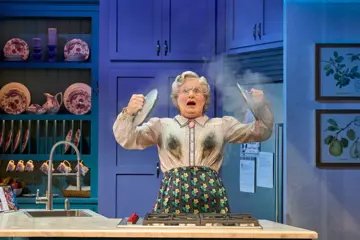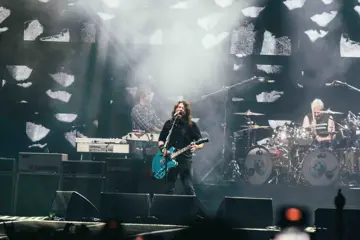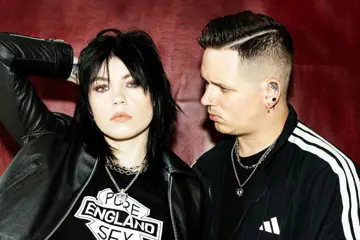 Beastie Boys
Beastie BoysAfter a battle with cancer that he struggled with for the past three years, Adam Yauch – aka MCA or Nathanial Hörnblowér – of Beastie Boys lost his life on Friday 4 May in his native Brooklyn, New York.
It was on Yauch's 17th birthday back in 1979 that the Beastie Boys played their first show; Yauch on bass, alongside Kate Schellenbach, John Berry and Michael “Mike D” Diamond, thrashing through a set of juvenile hardcore punk tunes. A line up shuffle saw guitarist Adam “Ad-Rock” Horovitz join the fold early in the next decade and, following an experimental hip hop EP led by title track Cookie Puss in 1983, the band made the switch from hardcore to hip hop in a jilted but somehow organic manner, Def Jam releasing another hip hop EP – the AC/DC sampling Rock Hard – with a young Rick Rubin in the producers' seat. Rubin had signed them to Def Jam, the label he had established not long prior and which soon-to-be-mogul Russell Simmons had just become involved in.
By this time the three MCs who were to make up the Beastie Boys had established the style they would carry through their career; Yauch particularly distinguishable through his raspy vocal delivery. Likewise they were establishing a unique musical vision and their marriage of hip hop and rock music was more than merely aesthetic, it was culturally thrilling for the time. When renowned hip hop critic Stephen Thomas Erlewine says the band were “the first white rap group of any importance” he's not overstating. The band showed that punk rock and hip hop (generally styles of music represented by a city's white and black communities respectively) could be aligned far closer than many had ever expected. Whether this had any real effect on racial harmony isn't something that could really be gauged in Australia, but it certainly opened opportunities for white artists to consider rap as a viable musical option.
While Ad-Rock and Mike D were in-your-face style rappers, Yauch's lines were more sedate and laidback, but no less witty than those of his counterparts.
Lyrically, he could be ridiculous – “If you try to knock me you'll get mocked; I'll stir fry you in my wok” (1998's Intergalactic) – and braggadocious – “Well I'm as cool as a cucumber in a bowl of hot sauce / You've got the rhyme and reason but no cause / Well if you're hot to trot you think you're slicker than grease / I've got news for your crew, you'll be sucking like a leach” (1992's So What'cha Want) – like his two counterparts. But perhaps his most powerful lines came when he was speaking out in almost direct opposition to the subject matter other hip hop artists were dining out on, after the Beasties realised their juvenile misogyny had well and truly been misconstrued – “I want to say a little something that's long overdue / the disrespect to women has got to be through / To all the mothers and the sisters and the wives and friends / I wanna offer my love and respect till the end” (1994's Sure Shot).
Don't miss a beat with our FREE daily newsletter
But it won't just be for his music that Yauch is remembered; after two trips through Tibet in the 1990s, Yauch began studying Tibetan Buddhism in 1992, becoming a Buddhist himself in 1996. In 1994 he co-founded the Milarepa Fund to raise awareness of China's brutal oppression of the Tibetan people and in San Francisco in 1996, Milarepa and the Beastie Boys organised Tibetan Freedom Concert; an event that attracted 100,000 attendees and featured performances from the likes of The Smashing Pumpkins, A Tribe Called Quest, Pavement, Cibo Matto, Biz Markie, Richie Havens, John Lee Hooker, Red Hot Chili Peppers, Rage Against the Machine, Sonic Youth, Beck, Foo Fighters, Björk, De La Soul, Fugees, Buddy Guy, The Skatalites, Yoko Ono/Ima and No Doubt, as well as the Beasties themselves. The next five years saw Tibetan Freedom Concerts take place in New York City, Washington D.C., Amsterdam, Wisconsin, Sydney, Tokyo, Tokyo and Taipei. Tenzin Dorjee, Executive Director of Students for a Free Tibet, who the concerts helped spur growth for, said “As the driving force behind the Tibetan Freedom Concerts, Adam revolutionized the Tibet movement.”
Yauch's passion for film burned strong for much of his Beastie Boys career. A Rolling Stone interview around the release of Hello Nasty revealed that Yauch would check into hotels under I. Clouseau, named for the Pink Panther character. His love of Peter Sellers aside, Yauch was a fervent filmmaker and possessed a unqiue vision for the music video medium. The clips he made, under the Hörnblowér non de plume, for tracks like So What'cha Want, Shadrach, Intergalactic, Shake Your Rump, Body Movin' and Three MC's & One DJ are all rather simple and quirky ideas but executed in a way that makes them devastatingly entertaining at the same time. And it was through his Oscilloscope Laboratories distribution company that we were able to see films like Wendy and Lucy, Scott Walker: 30 Century Man, We Need To Talk About Kevin, Exit Through the Gift Shop and Yauch's own Gunnin' For that #1 Spot, among many other great independent films.
Adam Yauch will always be MCA, one-third of the notorious party animals that were the Beastie Boys, but it doesn't take much delving to realise he was so much more than that. The world lost a truly fearless, gifted and unique creative artist last week, one who broke barriers and whose influence will be felt for many, many years to come.















